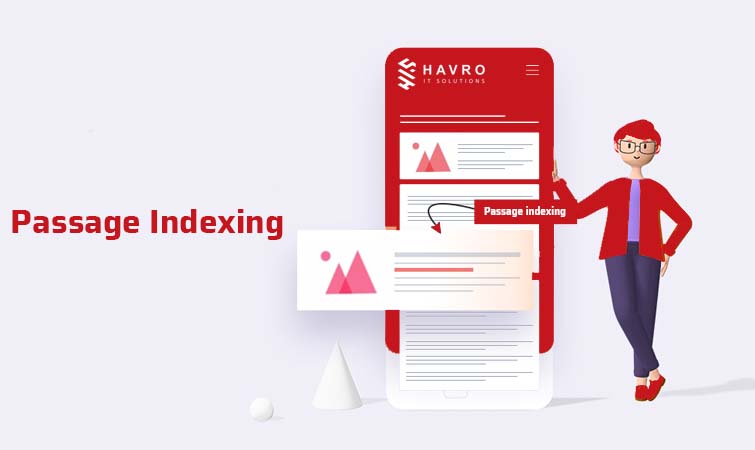What is Passage Indexing?
Passage indexing is an automated tool that pulls portions of pages into search engine results, even if the page is about something unrelated to the main topic. See how the best SEO company in Chennai can help you get a lot of traffic to your website.
SEO-Unlock large volumes of SEO traffic with SEO. Take a look at the outcomes.
Content Marketing – Our team creates amazing content that is shared, linked to, and generates traffic to our website.
Paid Media – Paid solutions that deliver a measurable return on investment.
What does that mean?
Consider the following scenario: Assume you’ve written a lengthy article about affiliate marketing. Because you wanted to cover everything about affiliate marketing, you included sections on how to be a successful affiliate marketer, what affiliate marketing tools to utilize, the most prominent affiliate marketing networks, and how to get started.
That’s a lot of important information, but it also implies that the entire piece is unlikely to score well for terms like “affiliate marketing networks,” because only one section covers the subject. Google may extract chunks of your text and rank them separately from the rest of the page using passage indexing. Even if the rest of the content isn’t optimized for that phrase, your part on “affiliate marketing tools” might rank for it.
See? It’s not a huge deal.
Take note of how Google has bolded some phrases it considers to be important to the search. It’s looking for keywords that indicate the content is likely to be relevant to a particular query. Because it’s a ranking change rather than an indexing update, Google’s Martin Splitt suggested calling the changes “Passage Ranking.” However, the names may be used interchangeably.
Passage Indexing vs. Featured Snippets: What’s the Difference?
Featured snippets provide users with an immediate solution to brief inquiries, eliminating the need for them to click to acquire the answer.
For example, if you type “what time is it in Paris” into Google, the answer appears at the top of the results page without having you click on it.
Passage indexing is a completely independent technique that examines a website’s content, assesses whether parts of the page answer a search query, and displays the results in the SERPs.
How Does Passage Indexing Work?
The search engine hasn’t been completely upfront about how the feature works, as it has with most of its products. Doesn’t it keep things interesting?
Here’s what we know so far.
Google, according to its blog, employs BERT and neural networks to better interpret text and rank passages as necessary. Google still indexes the entire page, but while crawling it, it looks for content and the meaning of passages. Each passage is annotated, graded, and scored separately.
Google also claims that the adjustment will only affect 7% of search queries, so don’t expect major changes. If your page already has a high rating, passage indexing (or passage ranking, if you prefer) may have no effect. Sites with useful long-form content that isn’t properly optimized, on the other hand, may notice a slight increase in rankings and, as a result, traffic.
Rather than looking at formulaic elements like keyword density, it appears that passage indexing is the next stage in leveraging AI algorithms like RankBrain to better grasp the context of the content. Keep in mind that passage indexing affects the ranking of specific passages rather than the pages Google indexes.
How Does Passage Indexing Affect SEO?
When it comes to SEO, how concerned should you be about passage indexing? It will have little to no effect on your SEO for most websites. Sites that notice a change will almost certainly see an increase in traffic. However, there are a few tiny differences worth noting.
- Long-form content has a better chance of ranking for a wider range of keywords. As a result, sites with shorter material may see a slight drop in ranking while longer-form content receives a lift.
- On-page SEO methods, such as employing the correct header and optimizing anchor text, are also more crucial than ever for sites. You could be outranked by pages with less optimization but superior content.
- If you’ve been putting off creating long-form content, now is the moment to start. Even if the page’s SEO isn’t ideal, Google shows that it’s eager to assist consumers to find important content.
- Shorter content sites, such as e-commerce sites, are less likely to observe a change in their Google ranking.
What Sites Will Be Affected by Passage Indexing?
The adjustment will especially benefit websites with long-form material that isn’t well optimized. Publishers with a well-defined SEO strategy, eCommerce sites with shorter material, and websites lacking long-form content are unlikely to experience any changes.
What Are the Advantages of Indexing Passages?
Let’s speak about why you should care now that we’ve covered what passage indexing is, how it works, and what influence it could have on our SEO. Are there any advantages to this alteration, or is it just another minor adjustment that you can overlook?
There are a few benefits of passage indexing:
- Longer-form content will benefit from this adjustment, which will help it rank higher for more precise keywords.
- Focus on users, not Google bots: Google is once again indicating that it prefers site owners to create information that is valuable to users rather than what the search bots won’t.
- Long-tail keywords have never been more important: Long-tail keywords and related topics are more likely to trigger passage indexing, therefore include phrases and longer terms, exactly like for voice search.
- On-page SEO elements may be (somewhat) less important: Google’s Martin Splitt underlined in the SEJ webinar that this adjustment is intended to aid pages with exceptional content that aren’t fully optimized. If the pages have fantastic content, they won’t be penalized, but don’t neglect on-page. Great content and on-page optimization will help sites in highly competitive niches stand out.
- It’s also worth mentioning that this adjustment will have no impact on Google penalties or traffic for most websites. This is a minor update designed to assist visitors in locating sites with useful material that may not be fully optimized.
How Can You Optimize for Passage Indexing?
In an interview, Google’s Martin Splitt was quick to point out that site owners should be wary of products or organizations that claim to be able to optimize for passage indexing, as it is a minor tweak geared at boosting long-form content sites.
While I don’t propose completely redesigning your website, there are a few little changes you may make, particularly for long-form content:
- Long-form entries should be updated with fresh stats, links, and resources.
- To help Google comprehend all of the topics covered in a piece, use clear, keyword-rich (but not too optimized) headlines for each part.
- Now is the moment to create long-form content if you don’t already have it. Cover as much of the subject as feasible, respond to typical inquiries, and employ long-tail keywords.
- If you have a page with a somewhat different portion relating to the primary issue, make sure it’s written correctly and optimized for the search terms people would use to locate it.
- Spend some time researching long-tail keywords and incorporating them into your long-form content.
- Overall, don’t try to optimize for passage indexing to the point of going insane. You may go too far in the opposite direction and over-optimize your site, which could hurt your rankings.
Is There a Tool to Assist Sites with Passage Ranking Optimization?
According to Martin Splitt, there will be no tool to determine whether or not your site is qualified for the modification. Your best bet is to follow the advice above and concentrate on developing content that meets the needs of your audience.
What Impact Will Passage Indexing Have on Search Marketing in the Future?
Although passage indexing is a minor modification in Google’s ranking system, it is worth noting. Google has long stated that users come first, and this is yet another example of that. Although SEO is important, your primary focus should be on your users.
It also demonstrates Google’s commitment to leveraging AI to comprehend a page’s context. Google uses RankBrain, DeepMind, machine learning, and natural language processing to interpret context better. This is a follow-up to their efforts.
This is fantastic news for digital marketers! Google strives to make its search results as relevant to users as possible. However, optimizing subpar content is no longer sufficient.
Conclusion
By now, I hope you’ve figured out what passage indexing is, why it’s important for your site, and how it can help you improve your Google rankings. Keep in mind that the majority of website owners will not need to make any modifications and will not face Google penalties. Long-form content sites may enjoy a minor gain in traffic and rankings.
This shift in Google’s ranking also hints at where the company might go in the future. The search engine is still focused on giving customers the greatest possible experience, which implies marketers should put their efforts in the same direction. Allow our team to assist you with SEO and offer a better customer experience.

